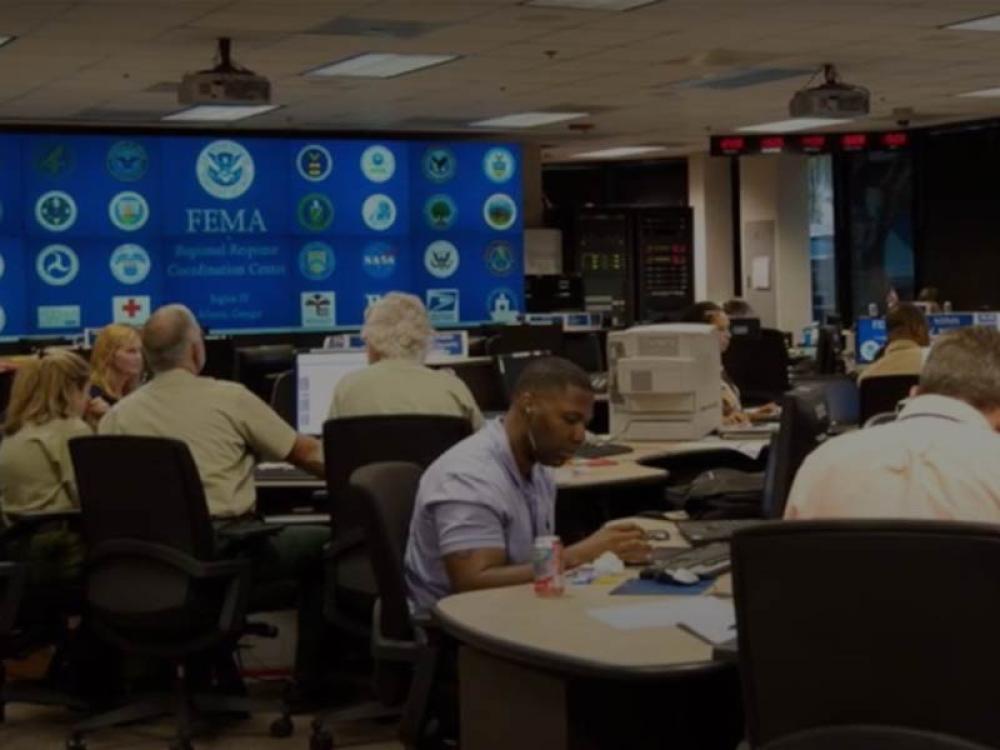"There is a tremendous amount of employment opportunity for students. This field is not going away - ever. If they have an interest in a particular area, I can help guide down that pathway."
David Bjorkman
- Faculty
- Emergency Management & Homeland Security
He brings years of law enforcement experience. A track record of success in emergency management and planning. And expertise in public health and medical preparedness. David knows there’s no substitute for hard-earned experience. That’s why his proven approach to training the next generation of leaders blends history, theory, and research with loads of hands-on drills and field exercises.

Guaranteed Momentum
The flexibility to be your best
Interested in Emergency Management & Homeland Security? Choose from a traditional hands-on program or learn remotely through the online option. Both bachelor-degree programs will arm you with the real-world skills to thrive. Or, pair your bachelor's with an associate's in Paramedic Science for even more career opportunities.
Q&A with David
WHAT IS THE BEST PART OF TEACHING AT PENN COLLEGE?
I am completely sold and buy into the applied, hands-on model Penn College takes in its program areas. I sometimes cannot believe that I'm actually paid to teach about my field of expertise! I think it is so important that our students learn from professionals who have actually been in the field, not simply from someone teaching a subject who has done years of research but never has been a police officer or emergency manager, for example. This is not to discount the importance of theory, research, and traditional academia at all, but there is something to be said for instructors who possess both the academic credentials AND professional experience and bring this blended perspective to the classroom.
DO YOU HAVE A FAVORITE SUBJECT TO TEACH OR STUDENT ACTIVITY?
I very much enjoy running Functional Emergency Operations Center (EOC) exercises for our students out of our lab space. In this hands-on component, students learn the fundamentals of EOC Management and the Incident Command System (ICS), which is the organizational structure we use in the public safety field to coordinate a response to a disaster. Exercises are one of the activities students will absolutely participate in while emergency managers. In addition to the lab exercises, my network affords students the opportunity to participate in exercises in the professional world.
HOW HAVE EMPLOYERS RESPONDED TO THE LEVEL OF PREPAREDNESS OF OUR GRADUATES?
I consistently receive positive feedback from employers and internship providers about our students' skills with respect to demonstrating an understanding of emergency planning.
Several years ago, one of our graduates applied to a county emergency management job in Maryland. Immediately after the interview, the Director contacted me by phone and told me that of the seven entry-level candidates he interviewed, all of whom had an EM degree, our student was the only one who could explain FEMA's Planning Process during the interview. He offered the student the job. This phone call reinforced in my mind that we are taking the correct approach in this program.
WHAT'S IT LIKE SEEING YOUR GRADUATES SERVE IN EMERGENCY MANAGEMENT ROLES?
I get very excited when I get a phone call or email from a student saying they have been offered a job. It motivates me when students land a job AND when I see the types of jobs they get. Emergency management touches every field. I have students working in county emergency management, federal government (e.g. FEMA and NSA) but also in banks, private emergency management consulting firms, and other related areas. Two graduates work for the consulting firm I worked for when I entered emergency management years ago. They were both hired by my former boss. On both occasions, he reached out to me and asked if we had any quality students graduating. I connected these students with my former boss, and they are both currently employed there.
DO YOU STAY IN TOUCH WITH FORMER STUDENTS?
WHAT ADVICE DO YOU HAVE FOR SOMEONE INTERESTED IN A CAREER IN THIS FIELD?
Writing is essential. Critical thinking is paramount. The ability to develop and maintain relationships is key. Network with everyone starting in college. Don't be afraid or disappointed to accept your first job that isn't "perfect" - get your foot in the door first. Listen to your professors. We are here to help. Students who trust what I'm teaching them AND work hard are happy right now with the jobs they get right after graduation.
Real-World Ready

David Bjorkman
Faculty, Emergency Management & Homeland Security
Real-World Ready

Taking the center stage
During a pandemic, we are reminded of the importance of essential careers like those in emergency management and homeland security. The historic COVID-19 crisis has provided a unique real-world opportunity for students to study professionals in action.
Real-World Ready

"Through my semesters of study, I have been given the opportunity to participate in mock scenarios, training exercises, and engaging professional discussions. That experience, paired with my instructor’s knowledge, couldn’t be beat anywhere else."
Brooke Strubel
Student, Emergency Management & Homeland Security
Programs
Emergency Management & Homeland Security
Learn how to prevent, prepare for, and respond to all types of emergencies and disasters.
All Programs
Unsure which major is right for you? See all academic programs at-a-glance.

